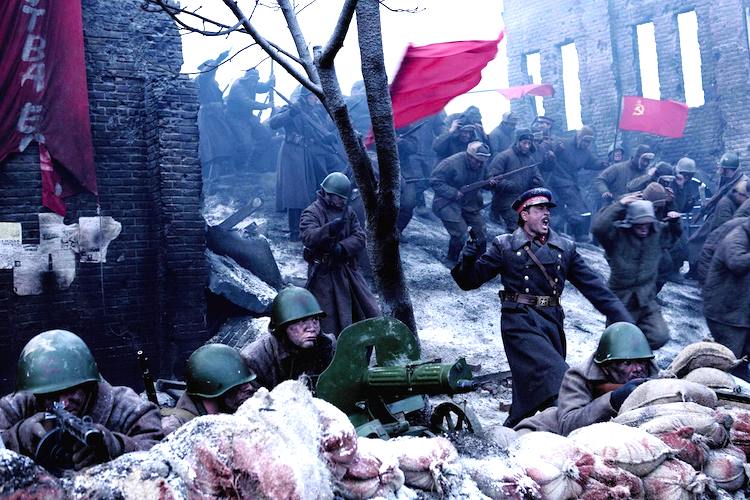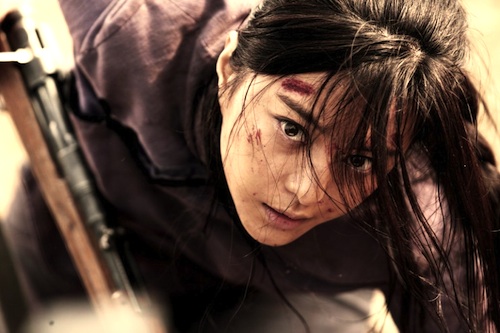By Joe Bendel. Kim Jun-shik could have been an Olympic champion marathoner, but the milestones defining his life involve involuntary military service. Impressed into the Imperial Japanese, Soviet, and National Socialist armies, Kim’s journey ultimately brought him to Omaha Beach on D-Day. It is an epic story (rather loosely based historical fact), told with appropriate grit and grandeur in Kang Je-kyu’s My Way (trailer above), which opens this Friday in New York.
Kim could always run fast, and from a young age his fate will be intertwined with that of Tatsuo Hasegawa. The grandson of a high-ranking Japanese officer, Hasegawa quickly becomes Kim’s primary competition on the track. Not surprisingly, the Japanese authorities put the fix in for Hasegawa at the Olympic trials, precipitating a full scale riot among outraged Korean spectators. Forced into the Japanese military as punishment, Kim eventually finds himself serving under Hasegawa, a harsh martinet in the tradition of his grandfather.
Needless to say, the campaign in Mongolia does not go well. Leading his men into a crushing defeat, Hasegawa is captured, along with Kim and several fellow Korean conscripts. Conditions in the Soviet labor camp are unbearably brutal, except for Kim’s friend Jong-dae, who becomes the Communist enforcer amongst the prisoners. Not unexpectedly, he reserves the harshest mistreatment for the Japanese, particularly Hasegawa, which troubles Kim despite their checkered history. When the war temporarily turns against the Soviets, the prisoners are given a grimly illegal choice: summary execution or service on the Eastern Front. Both are essentially death sentences.

Somehow surviving the ensuing carnage, Kim and Hasegawa head west, ready to declare themselves Japanese POWs when they encounter the Germans. Ironically, the conditions of service under the Nazis appear relatively mild compared to their stints with the Soviets and militarist Japanese, at least for a while. However, there are eerie (if unsubtle) parallels between all three militaries that clearly demonstrate the underlying similarities of oppressive regimes.
Like a cross between Saving Private Ryan and Chariots of Fire, My Way is a sprawling chronicle of sport, combat, and statist regimes that employs its flashback structure quite adroitly. There are a number of spectacularly rendered large scale battle scenes (in which it definitely helps to be swift of foot), but the film still packs a real emotional punch, particularly when depicting Kim’s brief relationship with Shirai, a captured Chinese sniper out to avenge her family.

One of the world’s most beautiful women, Fan Bingbing is absolutely heartbreaking as Shirai. Yet, it is Jang Dong-gun and Joe Odagiri who really carry the weight of the picture, as Kim and Hasegawa, respectively. They convincingly portray the two soldiers’ evolution from bitter enemies to stateless brothers-in-arms. On paper, much of their narrative would sound forced, but they make it work on-screen every step of the way.
Audiences should look past the oddly nondescript title, because it is hard to imagine there will be a better war film this year than My Way. Considerably superior to The Front Line, it is a cinematic saga worthy of the 70mm Cinemascope era. Highly recommended, it opens this Friday (4/20) in New York at the AMC Empire, the Beekman Theatre, and the Village East.
Posted on April 16th, 2012 at 3:09pm.
Notice how in Korean movies, Koreans tend to be victims of evil foreign powers?
There is a 속담 (proverb) in Korea. “when whales fight, the shrimp’s back is broken”. Japan and China are the whales and Korea is the shrimp that get’s tossed about.
They carry significant animosity towards the Japanese whom savagely ruled Korea to the point of outlawing the speaking of Korean, a language for which they are extremely proud. Couple that with the Chinese and the US/UN waging the opening salvos of the Cold War in a very warm way and you can see that they come by the view that they have been “victims of evil foreign powers” pretty honestly.